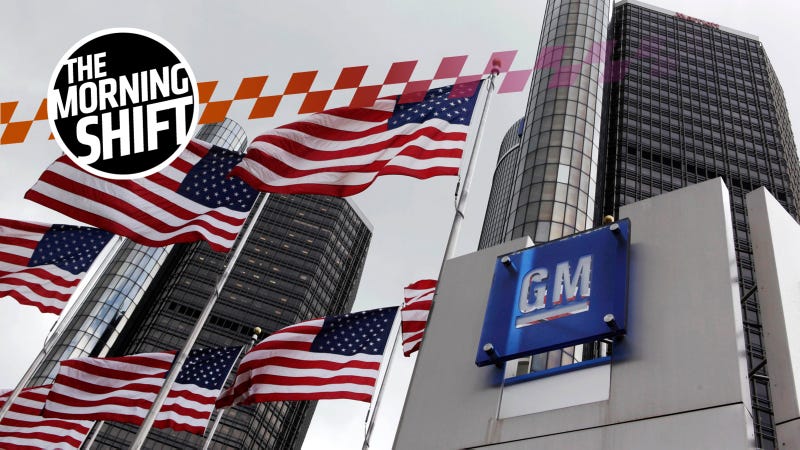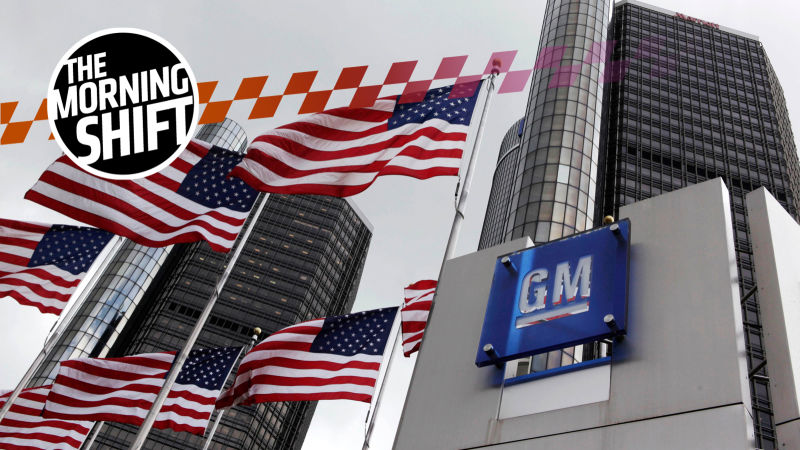
 The Morning ShiftAll your daily car news in one convenient place. Isn’t your time more important?
The Morning ShiftAll your daily car news in one convenient place. Isn’t your time more important? General Motors’ and Ford’s white-collar workers prepare for the worst even as their employers are profitable, Volvo thinks it can actually make money on this “electrification” thing, President Trump lights up GM and the UAW on a trip to Ohio and much more for The Morning Shift of Thursday, March 21, 2019.
1st Gear: ‘No One is Safe’
General Motors and Ford are both downsizing at the moment, reducing their respective global workforces, cutting back on salaried workers and even re-evaluating or closing factories. Unlike last time, these moves come as both automakers are doing relatively well and posting strong profits. But the automakers say cost-cutting is needed to fund the massive investments needed for electric and autonomous vehicle development.
Advertisement
This Detroit Free Press story goes into the anxiety and fear felt by many white-collar workers at both companies as they face layoffs in an industry once known for effective lifetime employment. No one’s happy about it, clearly, but GM has been more “transparent and expedient” in the cuts as opposed to Ford’s reported opaqueness.
From the story:
It’s a powerful lesson for Ford Motor Co. folks to remember: No one is safe.
As GM’s crosstown rival cuts salaried jobs across the company, some of those whacked by GM are now reflecting on their experience, the firing process and their life after GM.
They have advice to Ford employees: First, overconfidence is deadly; and second, “Start looking for another job, sell your house and downsize now,” said the laid-off GM employee.
[…] On Feb. 4, GM began cutting the white-collar jobs across North America as part of a restructuring intended to save the carmaker $2.5 billion this year. GM said as it went through the process if focused on being transparent and sharing as much information as possible with employees.
“We also made these decisions when the overall economy and job market is strong, which we feel increases the likelihood of our employees finding other job opportunities,” said GM spokesman Pat Morrissey.
The woman whom GM fired, who has a master’s degree in finance, was in a senior-level job. She said she was a top performer. But she also feared that she was an easy cut.
“They could get more bang for their buck from the younger tech people there,” she said. “I could lead better than they could, but they could probably produce more than I could. I didn’t have a development background that some of these millennials have. They’re very versatile.”
Advertisement
One of the laid off GM employees told the newspaper this:
“Managers were scrambling right up to the last day and everyone was scared,” he said. “That’s not fair. Companies should be like families and give employees time and notice, do it in a nice way. Instead, the last day, you get an email to say, ‘Meet me at 11:30′ and you’re called into a room and told your job is no longer needed. You’re given a packet and that’s it.”
A nice thought—but does that happen anywhere?
As with the factory workers also facing plant closures, there’s a sense of resentment that these cuts are happening now, as the economy is supposedly “good,” as the car companies themselves are doing so well and so relatively soon after the bailouts.
Advertisement
2nd Gear: The UAW VS. the Opioid Crisis
Speaking of auto jobs, the United Auto Workers union is set to go into contract negotiations later this year. And one of the big priorities it has now in negotiating health and safety issues is fighting the opioid addiction crisis.
This is extremely relevant to the auto industry for a lot of reasons. For one, the crisis is especially bad in the Midwest and in states with a heavy manufacturing presence. Additionally, working in an auto factory is a dangerous job, and injuries lead to overprescription for pain medications, which is proven to lead to more severe drug addictions.
Advertisement
From another Detroit Free Press story:
But the painkiller and heroin addiction epidemic plaguing the industrial heartland is different. “Thing here with opioid abuse is, it’s so deadly. With the introduction of fentanyl, it’s gone from a bad habit to a deadly habit with staggering numbers,” he said.
So, as the UAW negotiates wages, health care, job security and other traditional issues this summer with Detroit automakers, it also has identified combating opioids as a key priority in the upcoming collective bargaining talks this year.
Manufacturing employees are exposed to injury from standing for long periods of time, repetitive motion and heavy lifting, and they seek treatment, which in the past two decades has increasingly come in the form of prescription painkillers containing codeine, oxycodone (such as OxyContin) or hydrocodone (such as Vicodin). Those pills can quickly result in addiction, in time leading some people to seek cheaper, more accessible heroin. Heroin today often is laced with fentanyl, a synthetic opioid 50 times more potent than morphine.
The union already is training its workers to respond to overdoses, and some have saved lives in factories by administering Narcan, a brand name for naloxone, a drug that can halt ODs. A pain treatment pilot study is underway examining alternatives to prescriptions, the union said.
Advertisement
Anyway, this is a disaster for some people but big business to others.
3rd Gear: Trump Yells at Everybody
One more item on the state of America’s auto workers. As you well know by now, GM is closing down its Lordstown, Ohio plant amid nonexistent Chevrolet Cruze sales. But that’s in the heart of Trump Country, and something the president is eager to fix as he runs for reelection in 2020.
Advertisement
So in a trip to Ohio yesterday to visit the Lima Army Tank Plant, he had strong and Trumpian words for the UAW and GM alike. Via The Detroit News:
GM’s Lordstown Assembly, nearly 200 miles from Lima in northeast Ohio, is leading off the months-long process of the Detroit automaker’s U.S. production stops. Workers are already taking far-flung transfers to other GM operations, creating a different reality than the president promised when he told locals to keep their houses because the factory jobs were “all coming back.”
“Get that plant open,” Trump demanded, asking GM to either begin building in Lordstown again or find a company that will.
The president later turned his criticism to the UAW during his visit to UAW-represented Joint Systems Manufacturing Center, an Army tank plant in Lima that’s been a prominent presidential campaign stop dating back to the Dwight Eisenhower campaign in 1952.
“They could have kept General Motors,” Trump said of the UAW’s leaders. “They could have kept (GM) in that gorgeous plant in Lordstown.”
He criticized GM and union leaders as “not honest,” saying that union workers support him and that their leadership should “lower your dues.”
Advertisement
The president added:
“Lordstown is a great area. I guess I like it because I won so big there,” Trump said. Lordstown’s Trumbull County, formerly a Democratic stronghold, flipped to vote for Trump in 2016.
It’s not clear what effect this will have on upcoming negotiations, but neither entity probably wants to be in Trump’s crosshairs. Or on his Twitter timeline.
Advertisement
4th Gear: Volvo Predicts Big Surge in Plug-In Hybrid Sales
Which is good, because Volvo is doing a lot of those. The automaker is working to triple capacity to build more hybrids, citing surprising and underestimated demand for them. Via Automotive News:
Volvo expects a huge increase in sales of its plug-in hybrid vehicles by year-end after underestimating demand for its growing family of electrified models.
“By the end of the year we should be up to 20 to 25 percent,” Volvo CEO Hakan Samuelsson said during a roundtable discussion with journalists this week.
In the model lines where plug-in hybrids are currently available, this includes the XC90 and XC60 SUVs and the V90 and V60 station wagons, those variants account for about 10 percent to 15 percent of Volvo’s global sales.
Volvo didn’t have enough batteries, electric motors and the other key components needed to make its plug-in hybrids, Samuelsson said.
“We are not happy because we could sell more [plug-in hybrids],” he said. “We underestimated the demand.”
Advertisement
The hybrid models are especially popular in Europe, probably as buyers look for fuel-efficient alternatives as the world slowly weans itself off diesel.
5th Gear: Carlos Ghosn’s Trial Could Start in September
That was fast. From a very brief dispatch from Reuters:
The trial of former Nissan Motor Co boss Carlos Ghosn on charges of under-reporting his salary is expected to start in Tokyo in September, Japan’s public broadcaster NHK said on Wednesday.
Ghosn’s first court appearance may be on May 23 as part of the preparations for the trial, NHK said, citing sources familiar with discussions between the prosecution and the defense.
Advertisement
Should we hire someone to cover it from Tokyo? Do you care? I’m considering it.
Reverse: Forza Senna
Advertisement
Neutral: Cuts When Healthy, Good or Bad?
Where do you land on GM and Ford’s cost-cutting while things are good for them? Necessary for the future, or a betrayal of the American worker?













